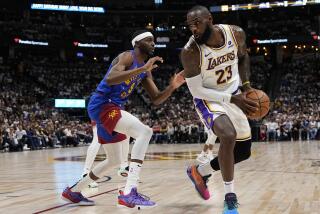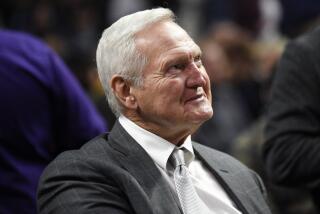For Revenue, NBA Has No Heir to ‘Air Jordan’
Imagine the numbers Michael Jordan might produce if he were playing one more season.
Not just points, rebounds and assists. Dollars and cents too.
A Jordan farewell tour would mean one more big payday for the National Basketball Assn., a last chance to milk the greatest cash cow the sports world has ever known. Experts estimate it would attract tens of millions in ticket sales, television advertising and merchandising.
“Every place he went, they would sell out,” said Mel Helitzer, a professor of sports administration at Ohio University in Athens, Ohio. “Every piece of junk they put his name on would sell like crazy.”
But with the Chicago Bulls superstar expected to announce his retirement at a news conference today, that money evaporates. Instead, the NBA is bracing for the loss of a player who, by some estimates, accounts for 10% to 20% of the league’s $2-billion annual revenue.
The projected loss of $100 million to $200 million comes at the worst possible time, in the wake of a costly lockout that has the league scrambling to win back fans.
“Obviously the league has hurt itself in terms of marketing and public relations,” said Sean Brenner, editor of Team Marketing Report in Chicago. “This is another step backward.”
League officials are not commenting.
No sport has ever had an athlete who could turn a profit as Jordan did. His economic impact was every bit as remarkable as his prowess on the court, where the man known as “Air Jordan” led the Bulls to six championships while winning five most valuable player trophies and a record 10 scoring titles.
His departure is expected to hurt television ratings immediately. Last season, the Bulls played eight regular season games on NBC, averaging a 6.5 rating, nearly twice that of games featuring other teams. Jordan and the Bulls have played in the four most-watched NBA championship finals, among them last season’s, which had a record 18.7 rating.
More viewers mean that networks can charge more money for commercial spots. The numbers helped the NBA negotiate a four-year, $2.64-billion contract with NBC and Turner Network Television last year, doubling the money of the previous TV deal.
“Now they don’t have those Jordan games to sell,” said Rick Burton, director of the Warsaw Sports Marketing Center at the University of Oregon. “That’s a huge hit.”
Or, as Helitzer said, “That must really have the NBA commissioner weeping.”
But television is only part of what Fortune magazine calls “the Jordan Effect.”
Fortune estimated last June that Jordan had generated $10 billion since turning professional in 1984. The total includes revenues from his commercials for Nike sneakers and Hanes underwear, 70 or so books written by and about him, a cologne created by Bijan and a film, “Space Jam,” in which Jordan cavorted with a cast of animated characters.
“It would be hard to come up with exactly the right adjective to describe his worth,” Brenner said. “He’s had an impact on every corner of the league’s business.”
Identifying the league’s take of all that money is difficult. Fortune quotes an article by Jerry A. Hausman, an MIT professor, and Gregory K. Leonard, director of Cambridge Economics, a consulting firm, who studied Jordan’s impact on the 1991-92 season.
Hausman and Leonard considered ticket sales, television ratings and merchandising. They measured, for instance, the increased attendance in cities such as Denver and Atlanta when Jordan came to town.
Their study showed that Jordan, while leading the Bulls to a championship victory over the Portland Trail Blazers, also managed to generate $53.2 million for the league.
Fortune took those calculations and extended them over Jordan’s career.
His presence has boosted ticket sales, at home and away, by an estimated $165.5 million. He has stimulated television revenues to the tune of $366 million. Chairman Dick Ebersol of NBC Sports called it “one of the most magical rides in sports history.”
But merchandising--all those NBA-licensed caps, jerseys and posters--has produced the biggest payday, by far. Fortune estimates that Jordan has had a $3.1-billion effect in that area.
The roots of the Jordan phenomenon, from a marketing standpoint, reach down years before the player arrived on the scene. The stylish Julius Erving led the way, experts say, drawing attention to a relatively young and decidedly second-class league.
Magic Johnson of the Lakers and Larry Bird of the Boston Celtics continued to build the NBA’s image in the 1980s, providing a dramatic rivalry that was piped into households nationwide by the new, sports-only cable networks. NBA Commissioner David Stern, who took office in Jordan’s rookie year, took care of the rest.
“Stern’s brilliance as a marketer was that he took it from being Boston against Los Angeles to being Magic against Bird,” Burton said. “He put faces to the game.”
Into this emerging cult of personalities stepped a young Jordan, a player of immense talent who was kept under wraps in college, playing in a tightly structured passing offense at the University of North Carolina. Set free in the pros, he flourished.
Jordan had the perfect combination of timing, talent and salesmanship.
“We’re talking about intelligence and charisma,” Brenner, of Team Marketing Report, said. “You can look at certain players and select certain ones who possess the charisma. But what the league cannot create is someone who is also head and shoulders above everyone else on the court.”
These characteristics were teamed up with aggressive marketing, most of it done by Nike, the Oregon shoe company that turned Jordan into the most recognized athlete on the planet. Fortune estimates the Jordan Effect on Nike sales at $5.2 billion.
The NBA received spillover benefits.
“Remember,” Burton said, “every ad for Michael Jordan was an ad for the league.”
And, as the years went by, Jordan’s celebrity only grew.
“The thing about Jordan, and it’s an emotional issue, is that he’s a clean hero,” Helitzer said. “From Clinton on down, everybody is shameful these days. Now you’re looking at a public that needs someone to admire.”
Not to mention a league that needs someone admirable to take Jordan’s place. Even Jordan has a reputation for high-stakes gambling, and NBA players from time to time have been suspended or arrested for drug possession, and one of the major stories of last season was the suspension of the Golden State Warriors’ Latrell Sprewell for choking his coach, P.J. Carlesimo. And as the recent lockout dragged on, sales of basketball footwear and apparel slipped 25% to 50%, said John Horan, publisher of the Sporting Goods Intelligence newsletter in Glen Mills, Pa.
But Horan is optimistic about the league’s ability to recover.
“In the short term, [the NBA] won’t replace that business,” he said. “But, in the long run, it might be a good thing. They’ve been riding the Michael Jordan-Chicago Bulls train for a lot of years and it’s gotten long in the tooth. In the long run, they can recast themselves.”
That means finding new a star, someone on which league executives can hang their marketing hat. Some young players seem to fit the mold--most often mentioned are Grant Hill of Detroit and Tim Duncan of San Antonio--but no one has risen above the crowd. Burton, the Oregon professor, is putting his money on Kobe Bryant of the Lakers.
“If the Lakers can win it all, then Kobe’s got the package,” he said. “He’s a champion and he’s young [20] and he’s cute.”
The NBA has time to beat the bushes for the next Jordan, at least until its four-year television deal runs out. Still, Helitzer says league executives should have tried harder to keep the old Jordan around, if only for one more season.
“If they gave him $50 million to play, it would be worth it,” Helitzer said. “It would certainly bring out the fans and make them feel basketball is important again.”
Audio and video excerpts from Michael Jordan’s retirement press conference today will be available on The Times’ Web site: http://netblogpro.com/jordan
* REACTION: Michael Jordan is lauded on all sides while the Chicago Bulls look to regroup. D1
* AD GAME: Retirement isn’t expected to have an impact on Jordan’s commercial ventures. C1
* MIKE DOWNEY: There goes Mr. Jordan. Poor Chicago . . . Things there will never be the same. A3
More to Read
Go beyond the scoreboard
Get the latest on L.A.'s teams in the daily Sports Report newsletter.
You may occasionally receive promotional content from the Los Angeles Times.











